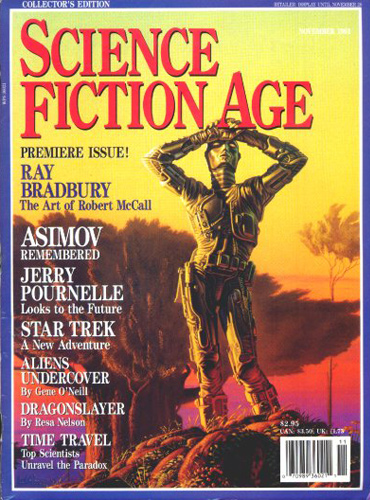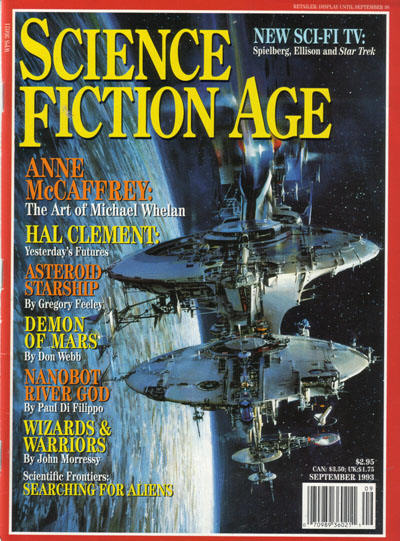Nobody is able to know for sure what tomorrow brings and what the future holds. The Best any of us can hope for is an educated guess...
Science Fiction Age
Eric Renderking Fisk - January 23rd, 2007
![]()
When New Years came along, I had the desire to write an article called "Science Fiction Age" and use this as an opportunity to illustrate how "The Future Is Now" and how the world we live in today is beyond the imagination of those who tried to predict the future during the Golden Era. I was going to post links to websites that are dedicated to those predictions made during those decades such as websites that hosts art from The Worlds Fair through out the decades and show you folks what people back then thought the world would look like today. And I was going to write about the obvious - pointing out to how they got it wrong. (I'm not writing this from a city in the clouds after commuting to work on my jet pack, am I?)
I was going to write about all the technology that everyone reading this article has access to and how we've taken it for granted. If you're reading this article on-line, not from some print out that someone gave you, then you have access to a computer that is far more powerful then the ones used during the lunar landings during the 1960's and 1970's. The computer you're using to read this is far more powerful and sophisticated the first probes sent to Mars and the gas giants during the late 1970's. But if you've read my articles here on The Fedora Chronicles and posts on various forums, you would have read those observations already, followed by my commentary asking all of us (myself included) what are we actually DOING with that power?
 We
have almost endless access to information. Because of our connection to
the internet we could easily download enough data to earn a degree in any
subject that interests us. We don't have to rely on just one organization
to get our news, we can simply tune into a vast number of sites to get the inside
scoop one what's going on. Every news channel has a website, just as every
newspaper and radio station. If you wanted to, you could sign up for news
alerts and have news items pertaining to any subject that interests you
emailed to you at your computer or hand-held device. And when you
find a news item that interests (or angers) you, you can discuss that news
item on any one of a countless number of forums populated with like minded
people with similar interests (The Fedora Chronicles Forum comes to mind...)
We
have almost endless access to information. Because of our connection to
the internet we could easily download enough data to earn a degree in any
subject that interests us. We don't have to rely on just one organization
to get our news, we can simply tune into a vast number of sites to get the inside
scoop one what's going on. Every news channel has a website, just as every
newspaper and radio station. If you wanted to, you could sign up for news
alerts and have news items pertaining to any subject that interests you
emailed to you at your computer or hand-held device. And when you
find a news item that interests (or angers) you, you can discuss that news
item on any one of a countless number of forums populated with like minded
people with similar interests (The Fedora Chronicles Forum comes to mind...)
When you're not receiving news alerts, you can contact anyone else anywhere via your cell phone. Sadly, so can your boss and bill collectors (if you dumb enough to give them your number.) Unless you're willing to shut your phone off, anyone can reach you and there's no where to hide (except in bad cell phone areas... which are becoming scarce with each passing month.) The future isn't what it used to be, which brings me to this..
Sitting on my desk was the inspiration for this rant is the premiere issue of the magazine Science Fiction Age. In this first issue there are a few articles about what subscribers of this magazine can expect from the editors and publishers, and on page 22 there's an essay written by Jerry Pournelle titled "The Future Isn't What It Used To Be, But Then Again Maybe It never Was." In the article, Mr. Pournelle writes about the community of SF writers and how things have changed over the years since he first started writing science fiction. He writes about how his world has changed since then and how SF writers have either maintained or changed their views of the future due to changes of the global political climate (this first issue was published just months after the end of the Cold War.) Mr. Pournelle writes about how the then "current" vision of the future of space travel was pretty bleak. (This was also years before Dick Rutan and Space Ship One, the Galileo and Cassini Missions... and just around the time the Hubble space telescope started to deliver images from deep space.)
In this article, Mr. Pournelle only slightly grazes or nicks the subject of the technology that would someday change the world: the Internet. "Apparently
many of us no longer conceive of a normal world where people go about making lives and careers for themselves; a world where computers and electronic networks and free exchange of information enhance our lives rather then creating the grizzly world of cyberpunk; a world where technology is intelligently applied to stop pollution and control unwanted environmental changes." Not sure if he succeeded in predicting the internet, but that's the closest thing I can remember (in context or not) being said about the future of the life on-line at the time. These who write about what might or could happen in the future can only make educated guess, and often they're blindsided just like the rest of us with a developing technology or application that does indeed change the world...In a magazine about the possibilities in the future, not one of the advertisers have websites or e-mail addresses in their ads. To know what they had to sell, you had to send them a dollar or two to get their catalog. Little did any of us know how much easier and more efficiently it would be to sell and buy things through the mail in just a few more years from that time. (There is, however an ad on page 77 for "Comp-U-Store," a service that helps consumers find great deals and sales... all you have to do is dial a 1-800 number via your modem.)
Around the same time of rediscovering this issue of Science Fiction
Age, the media was covering the International Consumer Electronics Show, a "who's who" and "what's what" of upcoming breakthroughs in gadgets, gizmos and software that today seem cutting edge but will be common place tomorrow. It's "Science Fiction Age" all over again, revealing to the world what the future holds. Again, technology that was just beyond the imagination of science fiction writers will be common place in the months or years to come.  Many
of us across the country were affected by the string of harsh storms causing
the power to go out. The obvious question asked itself, what's the use of
all this technology if there's no way to run it when there's no electricity?
(Let me just interject here that my wife and I aren't completely useless
when the power goes out, we have our own transportation, portable gas stoves
and a portable battery that has features which include a "cigarette lighter"
power adapter for the cell phones.) For the next two and a half days my
wife and I had to contend with there being no heat (the furnace pump and
igniter both run off the power grid) and no water (again, another pump that
runs off electricity.) This ice storm was followed by an artic blast of
cold air that lasted during the days that followed. We had to escape to
a hotel. We were essentially helpless with out "the juice".
Many
of us across the country were affected by the string of harsh storms causing
the power to go out. The obvious question asked itself, what's the use of
all this technology if there's no way to run it when there's no electricity?
(Let me just interject here that my wife and I aren't completely useless
when the power goes out, we have our own transportation, portable gas stoves
and a portable battery that has features which include a "cigarette lighter"
power adapter for the cell phones.) For the next two and a half days my
wife and I had to contend with there being no heat (the furnace pump and
igniter both run off the power grid) and no water (again, another pump that
runs off electricity.) This ice storm was followed by an artic blast of
cold air that lasted during the days that followed. We had to escape to
a hotel. We were essentially helpless with out "the juice".
Science Fiction Age, indeed. Many of the best "what if" scenarios of science fiction ask the fundamental questions about what would happen if our technology fails. What happens when something as basic as electricity is cut off and in the middle of winter there's no heat or water? I'm not trying to over-exaggerate our dilemma or make the hassle and inconvenience seem more life threatening then it really was, but what happened last week made me question what would happen to society and civilization if for what ever reason there was no more power ever again.
What if there was an electro-magnetic pulse caused by an accidental nuclear detonation or a terrorists atomic weapon which would render every device in the area useless? What if there was an event on either the political or geological scale that was so horrific that for some reason there was no more oil delivered to market with the same efficiency and consistency? Imagine a natural disaster such as the caldera (super volcano) in Yellowstone Park or any other major volcano erupting and causing hundreds of millions of tons of ash to block out the sun for years to come. Just as bad - a comet or asteroid the size of a small mountain strikes the surface of the earth and causes the same catastrophe.
The chances of any one of those things happening aren't high enough that we can live with some security that they might never happen in our lifetime. But the question is still there, what would happen to you and the ones you love if the worst would happen? It's easy to watch a documentary about natural or man-made disasters in the comfort of your home and living room and convince yourself you could survive. It's some thing different when there's no power for a few days in zero degree Fahrenheit weather or when faced with a real hurricane or flood. (And during these few days of being displaced and finding shelter elsewhere, I have a better idea of what the folks in the south had to endure during and after Hurricane Katrina.) Like I just proved, you don't need a MAJOR natural disaster to make life difficult or impossible when a harsh storm will do. And I shudder to imagine what happened to people with no access to transportation or had no one else to rely on to get them to warmth and safety.
With all of our modern technology and resources at hand, how prepared are we in the event that we are thrust into a situation or conflict that endangers our security or mere survival? I proved to my wife and kids that we would be fine for the first night or two, but after three or more days what good is a tank full of heating oil worth if there's no electricity ? What good is the internet and my desk top computer if I can't turn on and connect to read up on how to do something as simple as starting a fire with out matches?
I got the sense after only a few days of what might occur if there was a major catastrophe that made our modern tools useless, society would revert back to tribal warfare and feudalism. And if you think that those who lived during The Golden Age would have faired better, just look back at what happened after Orson Wells' Mercury Theater broadcast of their adaptation of "War Of The Worlds" or the panic that happened in the wake of Pearl Harbor.
But I'll wager that folks who lived during the 1930's and 1940's would have faired better during a long lasting catastrophe such as a loss of electricity over a vast area simply because their wood or coal burning stoves or fire places are more then mere decorations.
Unforgivable Darkness
 Around the same time of rediscovering this issue of Science Fiction Age, the media was covering the International Consumer Electronics
Show, a "who's who" and "what's what" of upcoming breakthroughs in gadgets,
gizmos and software that today seem cutting edge but will be common place
tomorrow. It's "Science Fiction Age" all over again, revealing to the world
what the future holds. Again, technology that was just beyond the imagination
of science fiction writers will be common place in the months or years to
come.
Around the same time of rediscovering this issue of Science Fiction Age, the media was covering the International Consumer Electronics
Show, a "who's who" and "what's what" of upcoming breakthroughs in gadgets,
gizmos and software that today seem cutting edge but will be common place
tomorrow. It's "Science Fiction Age" all over again, revealing to the world
what the future holds. Again, technology that was just beyond the imagination
of science fiction writers will be common place in the months or years to
come.
Many of us across the country were affected by the string of harsh storms causing the power to go out. The obvious question asked itself, what's the use of all this technology if there's no way to run it when there's no electricity? (Let me just interject here that my wife and I aren't completely useless when the power goes out, we have our own transportation, portable gas stoves and a portable battery that has features which include a "cigarette lighter" power adapter for the cell phones.) For the next two and a half days my wife and I had to contend with there being no heat (the furnace pump and igniter both run off the power grid) and no water (again, another pump that runs off electricity.) This ice storm was followed by an artic blast of cold air that lasted during the days that followed. We had to escape to a hotel. We were essentially helpless with out "the juice".
Science Fiction Age, indeed. Many of the best "what if" scenarios of science fiction ask the fundamental questions about what would happen if our technology fails. What happens when something as basic as electricity is cut off and in the middle of winter there's no heat or water? I'm not trying to over-exaggerate our dilemma or make the hassle and inconvenience seem more life threatening then it really was, but what happened last week made me question what would happen to society and civilization if for what ever reason there was no more power ever again.
What if there was an electro-magnetic pulse caused by an accidental nuclear detonation or a terrorists atomic weapon which would render every device in the area useless? What if there was an event on either the political or geological scale that was so horrific that for some reason there was no more oil delivered to market with the same efficiency and consistency? Imagine a natural disaster such as the caldera (super volcano) in Yellowstone Park or any other major volcano erupting and causing hundreds of millions of tons of ash to block out the sun for years to come. Just as bad - a comet or asteroid the size of a small mountain strikes the surface of the earth and causes the same catastrophe.
 The chances of any one of those things happening aren't high enough that
we can live with some security that they might never happen in our lifetime.
But the question is still there, what would happen to you and the ones you
love if the worst would happen? It's easy to watch a documentary about natural
or man-made disasters in the comfort of your home and living room and convince
yourself you could survive. It's some thing different when there's no power
for a few days in zero degree Fahrenheit weather or when faced with a real
hurricane or flood. (And during these few days of being displaced and finding
shelter elsewhere, I have a better idea of what the folks in the south had
to endure during and after Hurricane Katrina.) Like I just proved, you don't
need a MAJOR natural disaster to make life difficult or impossible when
a harsh storm will do. And I shudder to imagine what happened to people
with no access to transportation or had no one else to rely on to get them
to warmth and safety.
The chances of any one of those things happening aren't high enough that
we can live with some security that they might never happen in our lifetime.
But the question is still there, what would happen to you and the ones you
love if the worst would happen? It's easy to watch a documentary about natural
or man-made disasters in the comfort of your home and living room and convince
yourself you could survive. It's some thing different when there's no power
for a few days in zero degree Fahrenheit weather or when faced with a real
hurricane or flood. (And during these few days of being displaced and finding
shelter elsewhere, I have a better idea of what the folks in the south had
to endure during and after Hurricane Katrina.) Like I just proved, you don't
need a MAJOR natural disaster to make life difficult or impossible when
a harsh storm will do. And I shudder to imagine what happened to people
with no access to transportation or had no one else to rely on to get them
to warmth and safety.
With all of our modern technology and resources at hand, how prepared are we in the event that we are thrust into a situation or conflict that endangers our security or mere survival? I proved to my wife and kids that we would be fine for the first night or two, but after three or more days what good is a tank full of heating oil worth if there's no electricity ? What good is the internet and my desk top computer if I can't turn on and connect to read up on how to do something as simple as starting a fire with out matches?
I got the sense after only a few days of what might occur if there was a major catastrophe that made our modern tools useless, society would revert back to tribal warfare and feudalism. And if you think that those who lived during The Golden Age would have faired better, just look back at what happened after Orson Wells' Mercury Theater broadcast of their adaptation of "War Of The Worlds" or the panic that happened in the wake of Pearl Harbor.
But I'll wager that folks who lived during the 1930's and 1940's would have faired better during a long lasting catastrophe such as a loss of electricity over a vast area simply because their wood or coal burning stoves or fire places are more then mere decorations.
What Exactly Does The Future Hold?
If you're reading this expecting me to foretell the future and give you my accurate forecast of future events, here it is: Expect more of the same day after day for years to come with an occasional history making event that redefines who we are and what we're made of. Also, the global climate will become more unstable as we continue to rely on updated 19th and 20th Century means of heating our homes and transportation. Conflicts between nations will arise due to the scarcity of resources such as easily accessible oil. People will also be forced to migrate to more hospitable areas if the predictions about global warming are true.
Look forward to more people around you being disconnected to the real world around them as they become more plugged in and connected to the digital world - I'm no exception, either. I feel like I have more in common with the members of the Retro-Centric community (and the various forums that serve as it's suburbs) then I do with the people who live in the other homes around me. You can be assured that more of us will become overly reliant on gadgets and devices that might seem to be luxury items now but will seem to be essential to everyday life in the months and years to come.
My advice is to avoid that trap by getting more interested in devices and tools that you can use while camping or being self-sufficient in the event that your home loses power. Also, be sure to learn how to live with out most of the techno-fads that plague society. Learn to be a real hero of the future by not falling into the trap of constantly chasing after latest upgrade and become reliant upon the most advance tool ever known, the one tool that all others are useless with out it: your mind. One of the best worst case scenarios in great science fiction is what happens to society and civilization becomes too reliant on the technology and can't fend or think for themselves. Do what you can to prevent that from happening.
What are your thoughts on the genre of Science Fiction?
